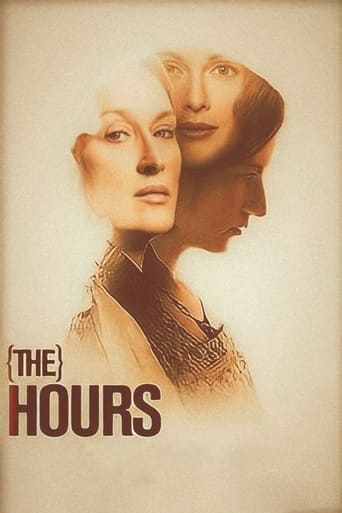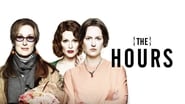hyunjikimd
This movie could be little bit boring for someone. But not many movies can describe living as a woman no matter 'when' and 'where' do you live, like 'The Hours' did. Three different women, they look different, their personalities are different, and they have to deal with their own different problems everyday .... but ironically they are all connected with another fictitious woman character, 'Mrs. Dalloway', so no matter how different they are, they go through with the same fate, 'living as women'.I am a woman too. I know the world is getting better and women's right has been improved a lot, but still a lot of women live under glass ceiling, which ask women to do this and do this, or not to do this... I hope this kind of movies keep coming so that we all can slowly break glass ceiling one by one.
GertrudeStern
Honestly, there is no exclamatory phrase in the tool belt of even a happy-mouthed Guy Fieri that can do justice to how strictly enjoyable The Hours is, especially for it's subject matter. It's basically an infinite recursion of intertextual frame narratives that center on the novel Mrs. Dalloway, which I had not read, but am currently reading...because of this movie.The screenplay is tight, hyper-aware of what it is doing and does so without feeling cumbersome much of the time. There is a particularly perfect spot where Meryl Streep's character discusses 'prescience', which is really the theme of the whole movie, and maybe even of Mrs. Dalloway...more to come on that.Bonus points: Nicole Kidman is unrecognizable, and really ceases to be herself while assuming Virginia Woolf, Phil Glass NAILS it on a score that ebbs and flows with the film's surrendering subjects and there's even a gorgeous scene where a hotel room quickly becomes what may or may not be Julianne Moore's final self-inflicted watery grave.
Python Hyena
The Hours (2002): Dir: Stephen Daldry / Cast: Nicole Kidman, Julianne Moore, Meryl Streep, Ed Harris, John C. Reilly: As indicated through dialogue by Ed Harris, the title represents those moments we either cherish or fail to realize. He uses the term, "paint" to describe those emotions. Flawed by its view of death with no mention of hope concluding upon grim notions that we are here to suffer. Virginia Woolf is played by Nicole Kidman in 1923 and isolated after two unsuccessful suicides. She longs for a life without madness. Julianne Moore plays a depressed mother and housewife in 1951 whose behavior affects her son in devastating matters. Meryl Streep plays a lesbian planning a party for the Ed Harris character but her very efforts are causing her life to cave in around her. John C. Reilly plays Moore's husband in the middle part of this three stage screenplay. Powerfully observed by director Stephen Daldry who is backed by a powerhouse cast. The three principal actresses are very good but the screenplay is quite depressing. We witness a suicide as these characters spiral downward into depression. What works is a rich cast and fitting production and makeup. Sound dialogue suggest staying alive for others. Perhaps we all should encourage one another as we go through our daily lives in hopes that we may make it through the hours. Score: 8 / 10
gsygsy
A bravura piece of screen writing by David Hare is the foundation on which this remarkable cinematic edifice is built. It is peopled by actors of the highest quality. Several of its images are truly haunting. Many of its scenes are tremendously powerful.The story concerns lives in different decades linked by Virginia Woolf's novel Mrs Dalloway. It's essentially a literary idea, based as it is on a book by Michael Cunningham. But Hare, director Stephen Daldry and their colleagues turn it into a poetic study of life and death. It is given urgency and unity by Philip Glass's score.The Hours aims high and mostly achieves what it sets out to do, but there are, perhaps inevitably, a couple of fumbles. A climactic scene between two of its leading actors is presented in a series of ever tighter close-ups, which ends up giving the impression that the characters might not be in the same room. If that was the idea, it was a mistake - we really need to feel them communicating, sharing the space. Also, one of the story strands feels much more contrived than the others, shoe-horned in to make it all work: this is, I'm pretty sure, a problem in the source material which the movie couldn't avoid inheriting.In the final analysis, these are quibbles. To embark on a project as ambitiously multi-layered as this in a commercial movie, and then to realise it as fully as The Hours does, is quite an achievement. Everyone connected with it should be very proud.





